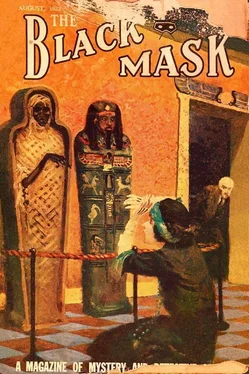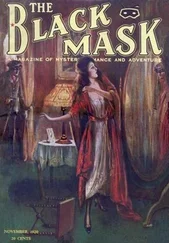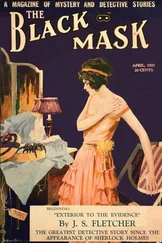John Baer - The Black Mask Magazine (Vol. 5, No. 5 — August 1922)
Здесь есть возможность читать онлайн «John Baer - The Black Mask Magazine (Vol. 5, No. 5 — August 1922)» весь текст электронной книги совершенно бесплатно (целиком полную версию без сокращений). В некоторых случаях можно слушать аудио, скачать через торрент в формате fb2 и присутствует краткое содержание. Город: New York, Год выпуска: 1922, Издательство: Pro-Distributors Publishing Company, Жанр: Детектив, на английском языке. Описание произведения, (предисловие) а так же отзывы посетителей доступны на портале библиотеки ЛибКат.
- Название:The Black Mask Magazine (Vol. 5, No. 5 — August 1922)
- Автор:
- Издательство:Pro-Distributors Publishing Company
- Жанр:
- Год:1922
- Город:New York
- ISBN:нет данных
- Рейтинг книги:4 / 5. Голосов: 1
-
Избранное:Добавить в избранное
- Отзывы:
-
Ваша оценка:
- 80
- 1
- 2
- 3
- 4
- 5
The Black Mask Magazine (Vol. 5, No. 5 — August 1922): краткое содержание, описание и аннотация
Предлагаем к чтению аннотацию, описание, краткое содержание или предисловие (зависит от того, что написал сам автор книги «The Black Mask Magazine (Vol. 5, No. 5 — August 1922)»). Если вы не нашли необходимую информацию о книге — напишите в комментариях, мы постараемся отыскать её.
The Black Mask Magazine (Vol. 5, No. 5 — August 1922) — читать онлайн бесплатно полную книгу (весь текст) целиком
Ниже представлен текст книги, разбитый по страницам. Система сохранения места последней прочитанной страницы, позволяет с удобством читать онлайн бесплатно книгу «The Black Mask Magazine (Vol. 5, No. 5 — August 1922)», без необходимости каждый раз заново искать на чём Вы остановились. Поставьте закладку, и сможете в любой момент перейти на страницу, на которой закончили чтение.
Интервал:
Закладка:
He imagined that he had heard a cry. Yet he was not certain. At any rate, Jones’s voice had stopped suddenly, but inasmuch as he, Murphy, was moving down the corridor at the time, he had given the matter no more thought.
Later he remembered again passing the office and noticing that the light had been extinguished. That was all that he knew about the affair until he saw Tompkins rush out of the place about midnight.
The man was plainly nervous and ill at ease, as is usually the case of the more ignorant when brought face to face with the law for the first time. Yet something about his manner caused me to do some hurried thinking. When he had completed his story I ordered him searched.
Hidden in his inside coat pocket Moore found a package of bills amounting to nearly one thousand dollars!
IV
Whence came that money? Hundred-dollar-a-month janitors are not apt to be carrying huge amounts of cash about their clothes. Breaking down under our questioning he said that he had found the money in the hallway close to the door at the time he had passed the office a third time and discovered it dark. He was a poor man, he said, with a wife and family to support. He had at first intended turning the money in to Grady, his superior, but later decided to keep it, hiding it until the hue and cry which was certain to follow its loss had blown over, when he would bank it a small amount at a time.
There was nothing for me to do but hold William Murphy for the murder of Levi Jones.
He confessed.
Yet after he had admitted to the killing of Levi Jones I felt that he was a liar even though his confession as I had written it and with his rambling signature at the end lay before me. The pieces refused to dovetail together.
Although policemen refuse to admit that there is such a thing as the “Third Degree,” seldom is a confession secured without using some method which would not stand the limelight of publicity. The newspaper boys know it and wink at it. It is necessary and, in some form or another, is used the world over. It is part of the price the criminal pays for his war against society. I used the “Third Degree" on William Murphy.
A glance at his peculiar complexion and the nervous twitching of his facial muscles showed that he was a “dope.” The presence of a small quantity of cocaine in his pocket substantiated the fact.
It was nearly morning when we arrested Murphy. He had been working all night. Naturally, he was tired and sleepy. For the remainder of that day and half of the following night Moore, Dugan, Miles and myself took turns keeping him awake. We questioned him constantly and from a thousand angles. He refused to tell a different story than the one he had given us at first — that of finding the money in the hallway.
On the table before his weary eyes we laid a big package of “dope.” At frequent intervals we brought into the room other “snowbirds.” We gave them free rein to the “snow.” The joyous light that overspread their features as they sniffed the poison was enough to break a stronger will than that of William Murphy. He finally gave up.
I read to him the confession as I had reconstructed the crime. According to my deductions Jones had gone to his office to work. He had opened the safe and was in his private office when Murphy entered to do the cleaning. In front of Jones was a package of bills he was counting. The paper cutter lay before him. Naturally he thought nothing of seeing Murphy — a man who was in the office daily — busied about his duties.
Working up to a point close to the money lender, Murphy had suddenly leaped forward, seized the old man by the throat with one hand and with the other plunged the knife into his breast. Even if there had been an outcry, no one would have heard it at that time of night and on that deserted floor. Recalling the stories he had heard of the folly of leaving finger-prints, he had hastily wiped off the knife-handle and the safe dial with his dust cloth — after looting the safe — and hurried back to his work, springing the lock on the door after him.
This was the crime as I reconstructed it and the confession in substance that Murphy signed.
He repudiated it next day at the preliminary hearing, upon the advice of his attorney.
And I, despite the fact that he had confessed to me, felt that the confession was a falsehood. For there was one weak spot in the whole affair.
Tompkins stuck to his assertion that there had been at least five thousand dollars in cash in the safe and securities amounting to between ten and fifteen thousand dollars. There was every reason to believe that as Jones’s clerk he knew what he was talking about. We had found less than a thousand dollars on Murphy when we searched him.
Granted that I was right and that the confession I had forced from the janitor was the truth, what had become of the remainder of the money? Murphy was not clever enough to hide it and keep it hidden in the face of the terrific grilling we had given him. Nor, on the other hand, was he clever enough to act as the tool for someone else, the payment being the money we had found on his person, and keep from disclosing the fact under the “Third Degree.”
There was something decidedly rotten in Denmark. I was man enough to admit this fact to Moore and his men during the recess after Murphy had taken the stand at preliminary hearing and to admit to them also that if Tompkins confirmed his statement regarding the amount of money when he took the stand that we would have considerable trouble in getting a conviction when the case came to trial. For the court had appointed to defend the janitor a young attorney of more than ordinary ability — a man who might be expected to do his utmost for his client on account of the advertising he would receive in case of an acquittal.
V
Tompkins was the first witness called after recess. He was visibly nervous, yet he retold the story he had told to me almost word for word. The prosecuting attorney was about to turn him over to the attorney for the defense for cross-examination when, like a bolt out of a clear sky, the truth suddenly came to me.
I leaned across the table and whispered to the prosecutor. A startled look flashed across his face, and an instant later he was on his feet moving for an adjournment. His motion was granted. Five minutes later he, Tompkins, Murphy and his attorney, Dugan, Moore, Miles and myself were closeted in the prosecutor’s rooms.
I turned upon Tompkins.
“You cur!” I shouted, shaking my fist under his nose; “you killed Levi Jones yourself, and I, like a fool, almost sent an innocent man to the gallows for your crime!”
He shrank back, while a gasp of astonishment went up from the others in the room.
“I–I—” he commenced to stammer. But I stopped him.
“Let me tell you just what happened,” I went on. “You and old Jones were working in the office during the early part of the evening. Murphy says that he saw a light when he passed the door. You lie when you say that Jones fired you during the afternoon. The truth of the matter is that the altercation took place at the time when Murphy says that he heard angry voices as he again passed the door.
“You had probably often quarreled before. Therefore, Jones had no suspicion when you passed behind him. You seized the knife and plunged it into his heart!
“The remainder was easy — for you are a smooth customer — so smooth that you had me hoodwinked all the way through! You rifled the safe, wiped off the finger-prints from it and the knife-handle, and then, watching your chance, tossed the roll of bill out into the hallway where you knew Murphy would find them when he started his cleaning. You knew that he was simple-minded — a dope fiend — knew just what his mental process would be and that he would admit anything under the terrors of the “third degree.” That you guessed right is proved by the result.
Читать дальшеИнтервал:
Закладка:
Похожие книги на «The Black Mask Magazine (Vol. 5, No. 5 — August 1922)»
Представляем Вашему вниманию похожие книги на «The Black Mask Magazine (Vol. 5, No. 5 — August 1922)» списком для выбора. Мы отобрали схожую по названию и смыслу литературу в надежде предоставить читателям больше вариантов отыскать новые, интересные, ещё непрочитанные произведения.
Обсуждение, отзывы о книге «The Black Mask Magazine (Vol. 5, No. 5 — August 1922)» и просто собственные мнения читателей. Оставьте ваши комментарии, напишите, что Вы думаете о произведении, его смысле или главных героях. Укажите что конкретно понравилось, а что нет, и почему Вы так считаете.












